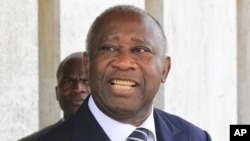Ivory Coast's defiant leader, Laurent Gbagbo, initially swept to power in 2000 as a champion of multiparty democracy.
The former history professor brought hope of a new kind of leadership to Africa, a continent known for so-called "Big Man" leaders who seize power by force and then refuse to give it up.
But his reputation declined over the past decade as elections were postponed again and again, and critics accused him of clinging to power.
Laurent Gbagbo was born to a Catholic family in the southern city of Gagnoa in 1945, when Ivory Coast was still a French colony.
After attending Sorbonne University in Paris, he returned to his homeland and became part of an underground movement critical of the country's autocratic government.
In 1971, he was arrested for "subversive teaching." After spending time in exile in Paris, Gbagbo returned to Ivory Coast in 1988, where he continued his political activism, and landed in prison again for a time.
He became president in 2000 - but only after a disputed election and a public revolt that forced his predecessor, Robert Guei, from office.
Gbagbo then withstood an uprising by northern-based rebels in 2002, and remained in power for the next eight-plus years, as his government and rebels tried to settle differences.
A 2007 peace treaty eventually paved the way for last year's presidential election. Gbagbo won the first-round vote but lost the U.N.-certified runoff, sparking the crisis that culminated in the past week's rebel offensive.
